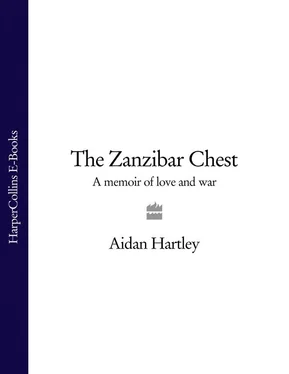The Zanzibar Chest: A Memoir of Love and War
Aidan Hartley
Copyright Copyright Dedication Epigraph Beyond the Rivers of Ethiopia Take Me Home to Mama Journalist Plus Plus The Zanzibar Chest Feeding the Beast Going Native The Sound of Freedom in the Air Empty Quarter Lazarus One Moment, of the Well of Life to Taste Herograms Postscript P.S. Ideas, interviews & features… About the author Profile of Aidan Hartley SNAPSHOT Top Twenty Favourite Reads About the book A Critical Eye Journalism and Death in East Africa Read on If You Loved This, You’ll Like… Find Out More Acknowledgements Praise About The Publisher
Harper Perennial
An imprint of HarperCollins Publishers 77–85 Fulham Palace Road, Hammersmith, London W6 8JB
www.harpercollins.co.uk
This edition published by Harper Perennial 2004
First published by HarperCollins Publishers 2003
Copyright © Aidan Hartley 2003
PS section copyright © Johnathan Clayton 2004
Photo credits: All chapter frontispiece photos courtesy of the Hartley family collection except: ‘Feeding the Beast’ frontispiece photo by Jim Hollander; ‘The Sound of Freedom in the Air’ frontispiece photo by Sam Ouma, courtesy Reuters; ‘Lazarus’ frontispiece photo by Aidan Hartley, courtesy Reuters; ‘Herograms’ frontispiece photo by Judy Walgren.
Lyrics from ‘I Whistle a Happy Tune’ by Richard Rodgers and Oscar Hammerstein II. Copyright © 1951 by Richard Rodgers and Oscar Hammerstein II. Copyright Renewed. WILLIAMSON MUSIC owner of publication and allied rights throughout the World. International Copyright Secured. All Rights Reserved. Used by Permission.
Aidan Hartley asserts the moral right to be identified as the author of this work
A catalogue record for this book is available from the British Library
All rights reserved under International and Pan-American Copyright Conventions. By payment of the required fees, you have been granted the non-exclusive, non-transferable right to access and read the text of this e-book on-screen. No part of this text may be reproduced, transmitted, downloaded, decompiled, reverse engineered, or stored in or introduced into any information storage and retrieval system, in any form or by any means, whether electronic or mechanical, now known or hereinafter invented, without the express written permission of HarperCollins e-books.
HarperCollins Publishers has made every reasonable effort to ensure that any picture content and written content in this ebook has been included or removed in accordance with the contractual and technological constraints in operation at the time of publication.
Source ISBN 978000651210
Ebook Edition © APRIL 2010 ISBN: 9780007380268
Version: 2014–09–08
To my wife and my mother
From time to time, God causes men to be born – and thou art one of them – who have a lust to go abroad at the risk of their lives and discover news – today it may be of far-off things, tomorrow of some hidden mountain, and the next day of some near-by men who have done a foolishness against the State. These souls are very few; and of these few, not more than ten are of the best.
Rudyard Kipling, Kim
Cover Page
Title Page
Copyright
Dedication
Epigraph
Beyond the Rivers of Ethiopia
Take Me Home to Mama
Journalist Plus Plus
The Zanzibar Chest
Feeding the Beast
Going Native
The Sound of Freedom in the Air
Empty Quarter
Lazarus
One Moment, of the Well of Life to Taste
Herograms
Postscript
P.S. Ideas, interviews & features…
About the author
Profile of Aidan Hartley
SNAPSHOT
Top Twenty Favourite Reads
About the book
A Critical Eye
Journalism and Death in East Africa
Read on
If You Loved This, You’ll Like…
Find Out More
Acknowledgements
Praise
About The Publisher
Beyond the Rivers of Ethiopia
MY FATHER WAS THE closest thing I knew to the immortal. ‘Our Father, who art in Africa,’ I prayed as a child of six. He’d always been there. When he died I couldn’t believe it. I had moments when I felt haunted by him in ways that were almost physical. They were a comfort to me. At home on the Indian Ocean coast, I swam off the beach and felt he was in the water all around me. On the upcountry plains, I imagined his bones were billowing up in the dust behind the nomads’ herds of cattle. I clung on but I felt him slipping away. In my stricken state I longed to pluck something back from oblivion.
The day came for us to go through Dad’s belongings. His private territory at home was a coconut-thatched veranda overlooking the beach. He kept his writing desk there and a single bed made of mountain cedar, lashed with thongs of rawhide from an oryx shot many years before. Some of his clothes were still hanging up in there, which described a life of sadhu-like simplicity: a few khaki bush shirts and shorts, the kikoi wraps we wear in Kenya like sarongs, as well as several pairs of camel-skin sandals.
In the corner of the veranda was a Zanzibar chest, carved with a skill modern Swahili carpenters have forgotten. The old camphor box bore a design of lotus, paisley and pineapple and it was studded with rivets tarnished green in the salty air. When I opened the chest lid, cobwebs tore and something scuttled into a corner. In the chest was the skin of a lion Dad had tracked down after it had killed one of his best bulls, a hunting horn, a flute of apricot wood and a stack of files. These last contained reports on missions to southern Sudan, livestock projects for the tribes of Karamoja, botanical studies and copious notes about camels. Always restless himself as a younger man, Dad had spent his last years devising schemes to help Africa’s nomads remain on the move, beyond the reach of those who wanted to settle them.
Inside one file were my father’s handwritten memoirs on which he had been working for years. I opened a second file and reached down to grasp the pages. The instant I touched them they began to crumble in my hands. Time, heat and the drenching humidity had ravaged them. Mildew dusted the covers, giving off that scent of the forgotten. The translucent geckos that roam our walls had laid their soft, ivory eggs along the spines of the notebooks. White ants and silverfish had eaten into the papers, leaving a web of brown capillaries. Their tracks threaded through written words and underlined paragraphs and burrowed into months and years of recollection. I began to read the papers. I quickly realized I had stumbled on a secret that had been buried for half a century. Here were the diaries of the man named Peter Davey, my father’s good friend. Ever since I was a boy, the story of Davey had crept in and out of conversation at home in vague, half-finished sentences. The tale had always been there, yet my father never properly talked about it. Davey was a silence, a shadow that moved constantly out of the corner of one’s eye. And now, as if it had been deliberately dropped into my lap, here was the full and tragic rendition of Davey’s life.
What I found in the Zanzibar chest was a story of lives so utterly different from my own, so exotic, set in another part of the world and in another time. I had never believed in any great cause, I was sent to fight no wars. What I admired most about my father, Davey and those like them is that they were men of action, whereas I was ever the observer, not the participant, which is the main reason I’m able to be here to tell this story.
Читать дальше












